Potholes...A Sign It’s Spring
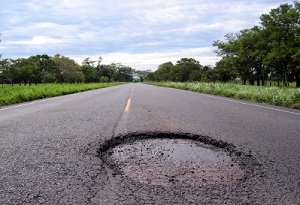 Nobody needs to remind you this has been an especially harsh winter.
Nobody needs to remind you this has been an especially harsh winter.
Winter is not just hard on vehicles and the people who drive them -- it’s hard on roads, too. With fluctuations in temperature and freeze/thaw cycles, pavement materials expand and contract, leaving streets with cracks and potholes. Add in the effect of washouts from heavy rain, caustic de-icing chemicals and damage from vehicles with studs or tire chains, and you can end up with springtime road surfaces which are a real mess.
Unfortunately, you can’t wait for the highway department to repair damaged pavement...you’ve got to get where you’re going, and your car’s tires, suspension and alignment are likely to pay the price. A hard impact on a pothole can be enough to tweak your front end ali ...[more]
Don’t Let Tire Problems Put the Brakes on Your Valentine’s Date
 Don’t let tire problems get in the way this Valentine’s day. How is your tire pressure? Do my tires need to be rotated? Is it time for an alignment? Do I need new tires? While these questions can seem daunting, with the help of tire professionals and various routine self-checks, any driver can maintain proper tire care and not miss that big date this Valentine’s Day. From tire rotations to air pressure, learning what signals might indicate tire replacement or repair is important for every vehicle owner.
Don’t let tire problems get in the way this Valentine’s day. How is your tire pressure? Do my tires need to be rotated? Is it time for an alignment? Do I need new tires? While these questions can seem daunting, with the help of tire professionals and various routine self-checks, any driver can maintain proper tire care and not miss that big date this Valentine’s Day. From tire rotations to air pressure, learning what signals might indicate tire replacement or repair is important for every vehicle owner. How to Avoid Tire Blowouts
 Through proper care and treatment of tires, serious or fatal accidents caused by blowouts are highly preventable if proper precautions are taken. Because tire blowouts can develop from many situations, drivers should strive to be aware of tire conditions and schedule professional check-ups accordingly. This is especially true during transitional weather periods. Take particular care to examine tire conditions as quickly changing temperatures can cause weak tires to fail.
Through proper care and treatment of tires, serious or fatal accidents caused by blowouts are highly preventable if proper precautions are taken. Because tire blowouts can develop from many situations, drivers should strive to be aware of tire conditions and schedule professional check-ups accordingly. This is especially true during transitional weather periods. Take particular care to examine tire conditions as quickly changing temperatures can cause weak tires to fail.Invest in the Future of any Vehicle with TPMS - Tire Pressure Monitoring Systems
 As most drivers can contest firsthand, tires are not invincible. Composed from many separate layers of steel-encased rubber fabrics and durable materials, tires eventually wear down and can cause vehicle owners costly repairs or even replacement. Understanding what measures should be taken to properly maintain tires will both lengthen tire life and support vehicle functionality and longevity. Tire Pressure Monitoring Systems (TPMS) introduce revolutionary tire protection technology to constantly report on tire pressure in each tire for vehicle safety and sustainability.
As most drivers can contest firsthand, tires are not invincible. Composed from many separate layers of steel-encased rubber fabrics and durable materials, tires eventually wear down and can cause vehicle owners costly repairs or even replacement. Understanding what measures should be taken to properly maintain tires will both lengthen tire life and support vehicle functionality and longevity. Tire Pressure Monitoring Systems (TPMS) introduce revolutionary tire protection technology to constantly report on tire pressure in each tire for vehicle safety and sustainability.
Without assistance from a Tire Pressure Monitoring System (TPMS), tires become more susceptible to avoidable damages due to low tire pressure. In the United States, according to National Highway Tr ...[more]
Is it Time for a Tire Rotation?
 Tire rotation is an easy maintenance item that has long term benefits for any vehicle. When properly maintained, tire rotations can improve fuel economy, extend tire life and provide drivers better handling through improved stability. Frequently servicing vehicles with tire rotations is imperative to sustaining tire tread by ensuring all tires are used evenly without excessive wear to one section or another.
Tire rotation is an easy maintenance item that has long term benefits for any vehicle. When properly maintained, tire rotations can improve fuel economy, extend tire life and provide drivers better handling through improved stability. Frequently servicing vehicles with tire rotations is imperative to sustaining tire tread by ensuring all tires are used evenly without excessive wear to one section or another.
Normal tread wear is unavoidable due to uneven vehicle weight dispersal, vehicle performance, etc. Without tire rotations, tires continue to wear on the same areas over and over, causing irreversible damage to tire tread which drastically decreases tire life. Engine weight accounts for a major portion of vehicle weight, causing front tires to wear significantly faster than back tires. Front tires ...[more]
Summer Heat
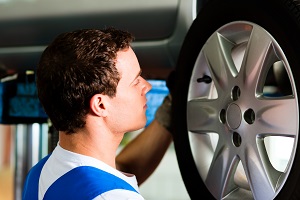 Most of us know tires are one of the most important safety features of any vehicle and want to keep our tires in the best condition possible. However, what you do not know about tire wear and tire pressure could be damaging them the most. According to the National Highway Traffic Safety Association, nearly 200 driving casualties per year occur at the hands of unmaintained tires. Right now it is estimated that 1 in 4 cars on the road are driving with underinflated tires.
Most of us know tires are one of the most important safety features of any vehicle and want to keep our tires in the best condition possible. However, what you do not know about tire wear and tire pressure could be damaging them the most. According to the National Highway Traffic Safety Association, nearly 200 driving casualties per year occur at the hands of unmaintained tires. Right now it is estimated that 1 in 4 cars on the road are driving with underinflated tires.Determining the Age of a Tire
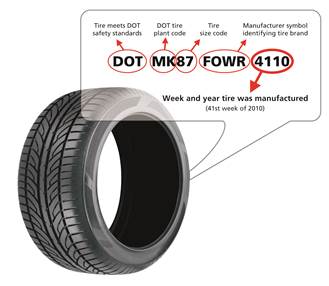 When it comes to determining the age of a tire, it is easiest to identify when the tire was manufactured by reading its Tire Identification Number (often referred to as the tire’s serial number or DOT number). Unlike vehicle identification numbers (VINs) and the serial numbers used on many other consumer goods (which identify one specific item), Tire Identification Numbers are really batch codes that identify several components.
When it comes to determining the age of a tire, it is easiest to identify when the tire was manufactured by reading its Tire Identification Number (often referred to as the tire’s serial number or DOT number). Unlike vehicle identification numbers (VINs) and the serial numbers used on many other consumer goods (which identify one specific item), Tire Identification Numbers are really batch codes that identify several components.4tire | Inventory Selection
10 Ways to Get Better Gas Mileage
 Who doesn’t want better gas mileage these days? Maximizing your fuel efficiency will not only save you money, it is better for your vehicle and the environment! With some proper maintenance, and simple tips and tricks, you can make fewer trips to the pump, which will be friendlier on your car, and your wallet.
Who doesn’t want better gas mileage these days? Maximizing your fuel efficiency will not only save you money, it is better for your vehicle and the environment! With some proper maintenance, and simple tips and tricks, you can make fewer trips to the pump, which will be friendlier on your car, and your wallet.
-
Tires - The right tires for your driving conditions are important. For the best gas mileage choose low rolling resistance tires. These are designed to maximize fuel efficiency and performance by increasing the tire’s grip on the road. Tires for racing and oversized off-roading tires are designed only for specific uses, and shouldn’t be used as your vehicle’s primary tires.
-
...[more]
| << Previous | 1234567 |



